Binghamton University Libraries recognize Arab American Heritage Month this April by celebrating Arab American culture and its contributions to literature and other fields. Explore this reading list, and other works in our collection by Arab American authors. Learn more about the resilience of Arab Americans confronted with anti-Arab racism, xenophobia and difficulties fitting into diverse spheres of both Arab and American cultures. Join us in celebrating Arab American culture this month and throughout the year!
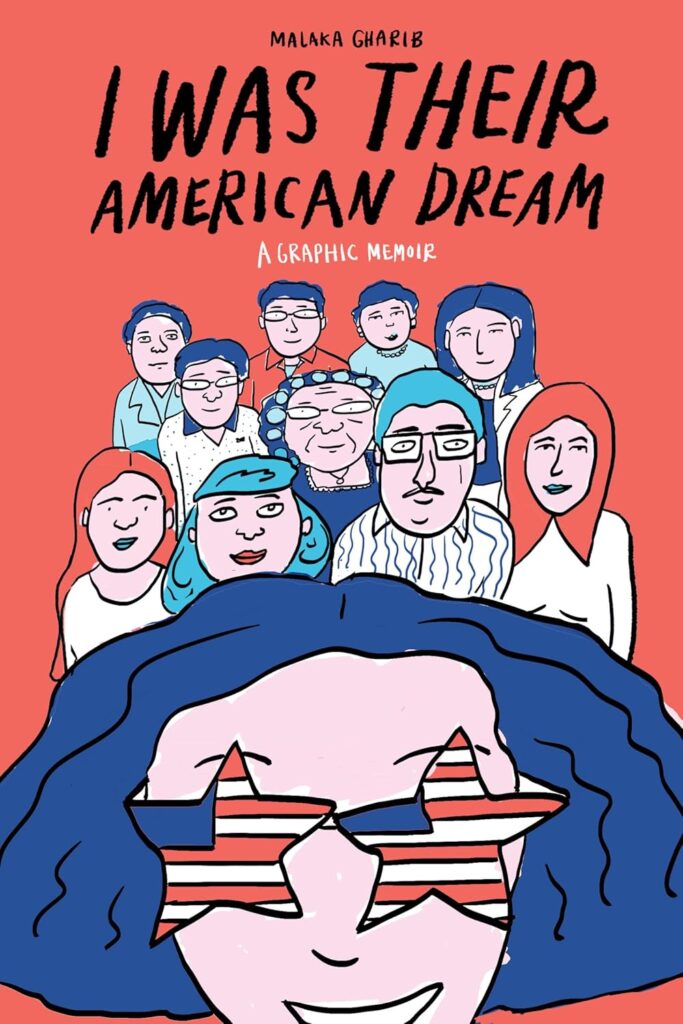
I was their American dream
by Malaka Gharib
I Was Their American Dream is at once a coming-of-age story and a reminder of the thousands of immigrants who come to America in search for a better life for themselves and their children. The daughter of parents with unfulfilled dreams themselves, Malaka navigated her childhood chasing her parents’ ideals, learning to code-switch between her family’s Filipino and Egyptian customs, adapting to white culture to fit in, crushing on skater boys, and trying to understand the tension between holding onto cultural values and trying to be an all-American kid. Malaka Gharib’s triumphant graphic memoir brings to life her teenage antics and illuminates earnest questions about identity and culture, while providing thoughtful insight into the lives of modern immigrants and the generation of millennial children they raised. Malaka’s story is a heartfelt tribute to the American immigrants who have invested their future in the promise of the American dream.

Girls that never die: poems
by Safia Elhillo
In Girls That Never Die, award-winning poet Safia Elhillo reinvents the epic to explore Muslim girlhood and shame, the dangers of being a woman, and the myriad violences enacted and imagined against women’s bodies. Drawing from her own life and family histories, as well as cultural myths and news stories about honor killings and genital mutilation, she interlaces the everyday traumas of growing up a girl under patriarchy with magical realist imaginings of rebellion, autonomy, and power. Elhillo writes a new world: women escape their stonings by birds that carry the rocks away; slain girls grow into two, like the hydra of lore, sprouting too numerous to ever be eradicated; circles of women are deemed holy, protected. Ultimately, Girls That Never Die is about wrestling ourselves from the threats of violence that constrain our lives, and instead looking to freedom and questioning: [what if i will not die] [what will govern me then]
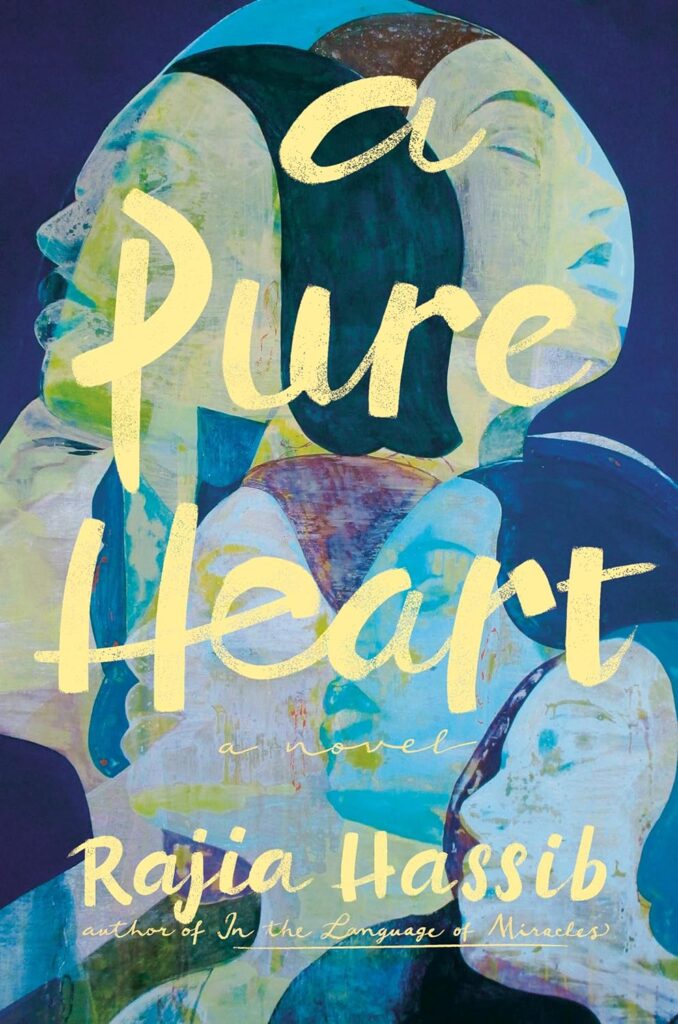
A pure heart: a novel
by Rajia Hassib
A powerful novel about two Egyptian sisters–their divergent fates and the secrets of one family. Sisters Rose and Gameela Gubran could not have been more different. Rose, an Egyptologist, married an American journalist and immigrated to New York City, where she works in the Metropolitan Museum of Art. Gameela, a devout Muslim since her teenage years, stayed in Cairo. During the aftermath of Egypt’s revolution, Gameela is killed in a suicide bombing. When Rose returns to Egypt after the bombing, she sifts through the artifacts Gameela left behind, desperate to understand how her sister came to die, and who she truly was. Soon, Rose realizes that Gameela has left many questions unanswered. Why had she quit her job just a few months before her death and not told her family? Who was she romantically involved with? And how did the religious Gameela manage to keep so many secrets? Rich in depth and feeling, A Pure Heart is a brilliant portrait of two Muslim women in the twenty-first century, and the decisions they make in work and love that determine their destinies. As Rose is struggling to reconcile her identities as an Egyptian and as a new American, she investigates Gameela’s devotion to her religion and her country. The more Rose uncovers about her sister’s life, the more she must reconcile their two fates, their inextricable bond as sisters, and who should and should not be held responsible for Gameela’s death. Rajia Hassib’s A Pure Heart is a stirring and deeply textured novel that asks what it means to forgive, and considers how faith, family, and love can unite and divide us.
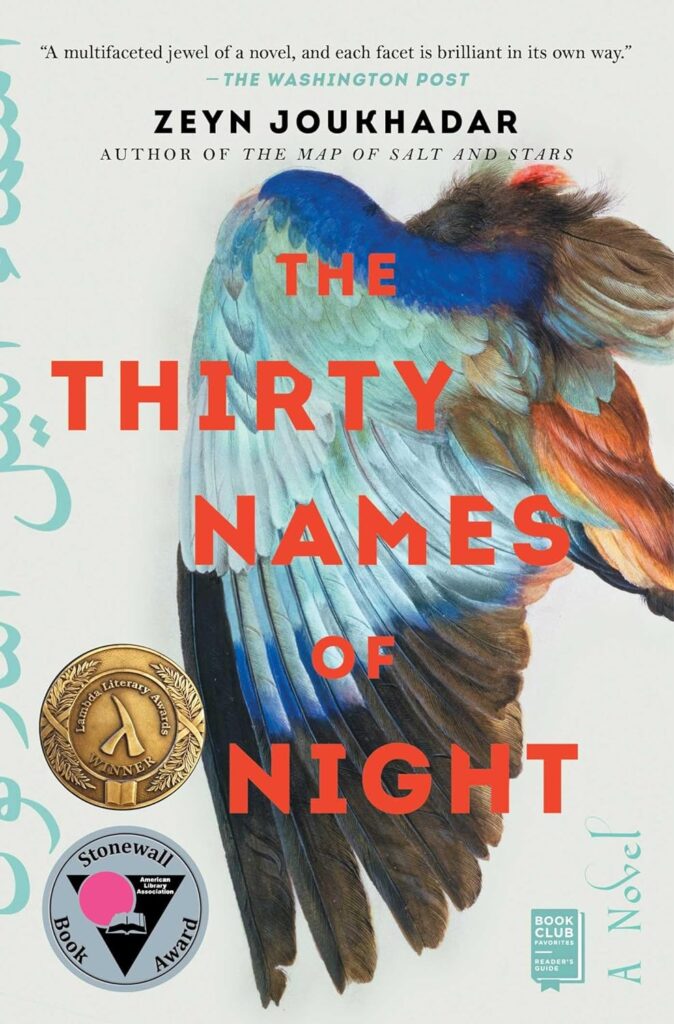
The thirty names of night
by Zeyn Joukhadar
From the author of the acclaimed and award-winning debut The Map of Salt and Stars, a remarkably moving and lyrical novel following three generations of Syrian Americans who are linked by the truths they carry close to their hearts. Five years after a suspicious fire killed his mother, a closeted Syrian American trans boy sheds his birth name and searches for a new one. He has been unable to paint since his mother’s ghost has begun to visit him each evening. The only time he feels truly free is when he slips out at night to paint murals on buildings in the once-thriving Manhattan neighborhood known as Little Syria. One night, he finds the tattered journal of a Syrian American artist named Laila Z. She famously and mysteriously disappeared more than sixty years before, but her journal contains proof that Laila Z’s past is intimately tied to his mother’s-and his grandmother’s–in ways he never could have expected. Even more surprising, Laila Z’s story reveals the histories of queer and transgender people within his community that he never knew. Following his mother’s ghost, he uncovers the silences kept in the name of survival by his own community, his own family, and within himself, and discovers the family that was there all along. The Thirty Names of Night is an imaginative and intimate exploration of how we all search for and ultimately embrace who we are.
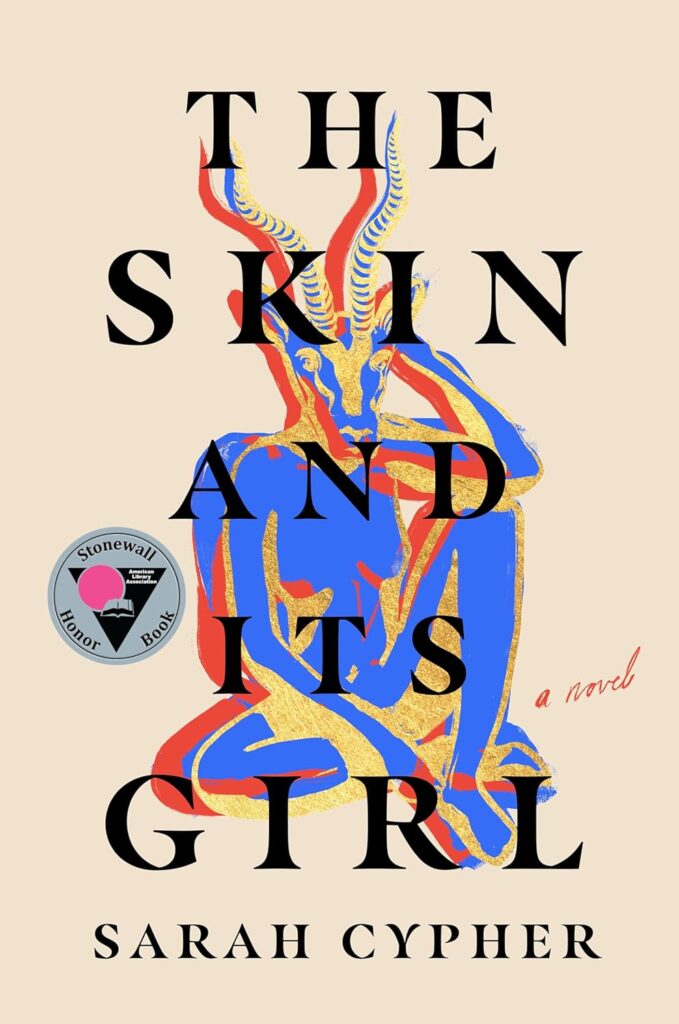
The skin and its girl
by Sarah Cypher
A young, queer Palestinian American woman pieces together her great aunt’s secrets in this sweeping debut, a family saga confronting questions of sexual identity, exile, and lineage. In a Pacific Northwest hospital far from the Rummani family’s ancestral home in Palestine, the heart of a stillborn baby begins to beat and her skin turns a vibrant, permanent cobalt blue. On the same day, the Rummanis’ centuries-old soap factory in Nablus is destroyed in an air strike. The family matriarch and keeper of all Rummani lore, Aunt Nuha, believes that the blue girl embodies their sacred history, harkening to a time when the Rummanis were among the wealthiest soap-makers and their blue soap was a symbol of a legendary love. Decades later, Betty returns to her Aunt Nuha’s gravestone, faced with a difficult decision: Should she stay in the only country she’s every known or should she follow her heart for the woman she loves, perpetuating her family’s cycle of exile? Betty finds her answer in partially translated notebooks that reveal her aunt’s complex life and struggle with her own sexuality, which Nuha hid to help the family emigrate to the U.S. But as Betty soon discovers, her aunt hid much more than that. The Skin and Its Girl is a searing, poetic tale about desire and identity and a provocative exploration of how we let stories divide, unite, and define us-and even wield the power to restore a broken family. Sarah Cypher is that rare debut novelist who writes with the mastery and flair of a seasoned storyteller.
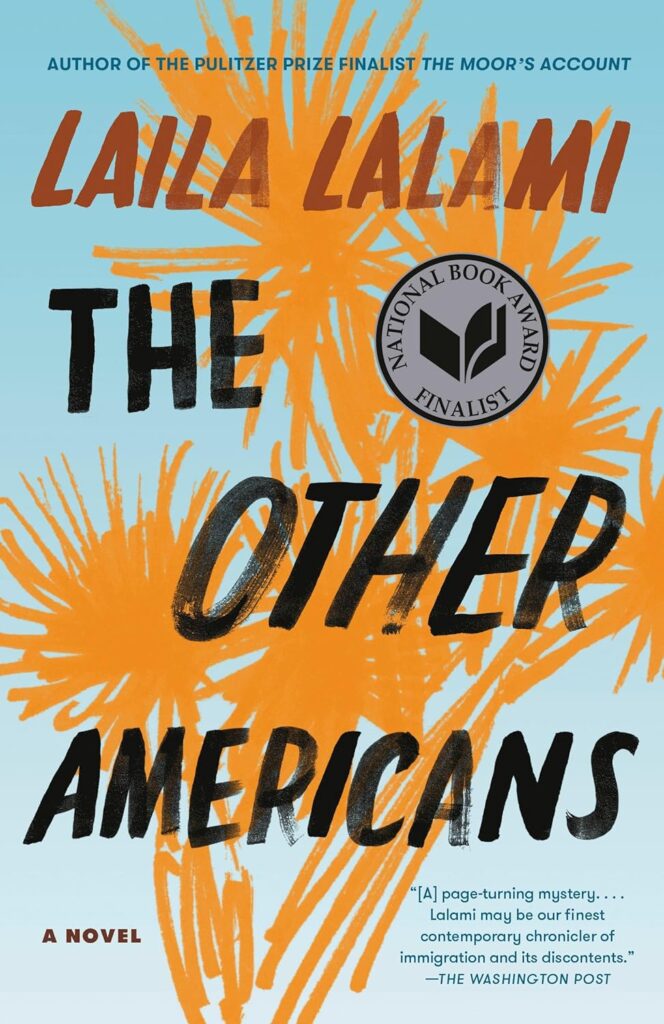
The other Americans
by Laila Lalami
From the Pulitzer Prize finalist, author of The Moor’s Account–a timely and powerful new novel about the suspicious death of a Moroccan immigrant that is at once a family saga, a murder mystery, and a love story, all of it informed by the treacherous fault lines of American culture. Nora Guerraoui, a jazz composer, returns home to a small town in the Mojave after hearing that her father, owner of a popular restaurant there, has been killed in a suspicious hit-and-run car accident. Told by multiple narrators–Nora herself, Jeremy (the Iraq war veteran with whom she develops an intimacy), widow Maryam, Efrain (an immigrant witness to the accident who refuses to get involved for fear of deportation), Coleman (the police investigator), and Driss (the dead man himself), The Other Americans deftly explores one family’s secrets and hypocrisies even as it offers a portrait of Americans riven by race, class, and religion, living side by side, yet ignorant of the vicissitudes that each tribe, as it were, faces.
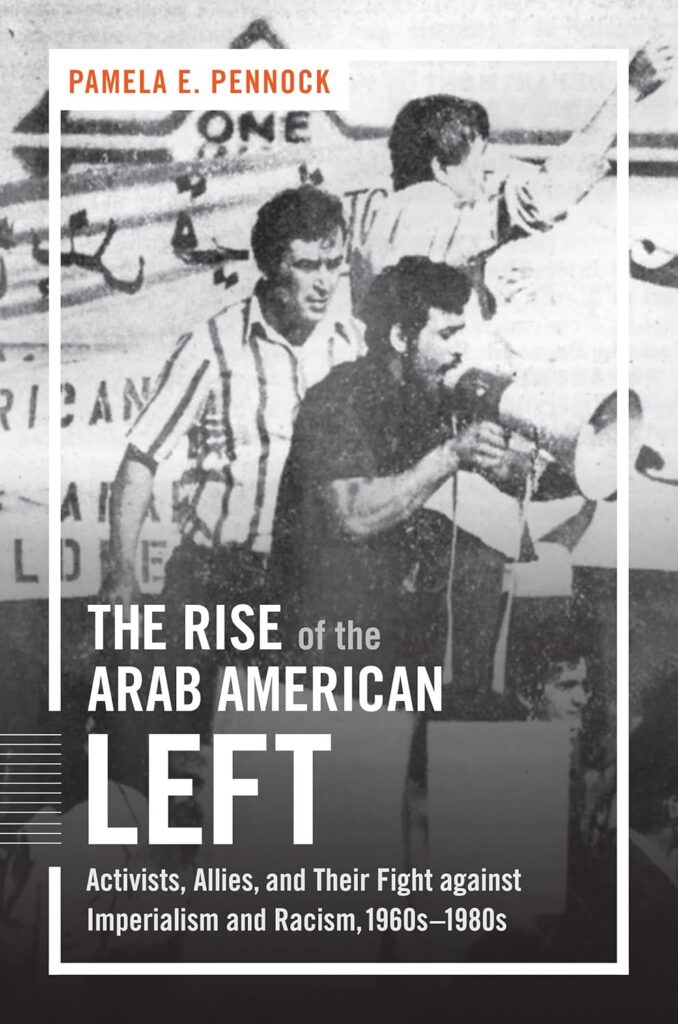
The rise of the Arab American left: activists, allies, and their fight against imperialism and racism, 1960s-1980s
by Pamela E. Pennock
In this first history of Arab American activism in the 1960s, Pamela Pennock brings to the forefront one of the most overlooked minority groups in the history of American social movements. Focusing on the ideas and strategies of key Arab American organizations and examining the emerging alliances between Arab American and other anti-imperialist and antiracist movements, Pennock sheds new light on the role of Arab Americans in the social change of the era. She details how their attempts to mobilize communities in support of Middle Eastern political or humanitarian causes were often met with suspicion by many Americans, including heavy surveillance by the Nixon administration. Cognizant that they would be unable to influence policy by traditional electoral means, Arab Americans, through slow coalition building over the course of decades of activism, brought their central policy concerns and causes into the mainstream of activist consciousness. With the support of new archival and interview evidence, Pennock situates the civil rights struggle of Arab Americans within the story of other political and social change of the 1960s and 1970s. By doing so, she takes a crucial step forward in the study of American social movements of that era.
Book descriptions based on publisher information






